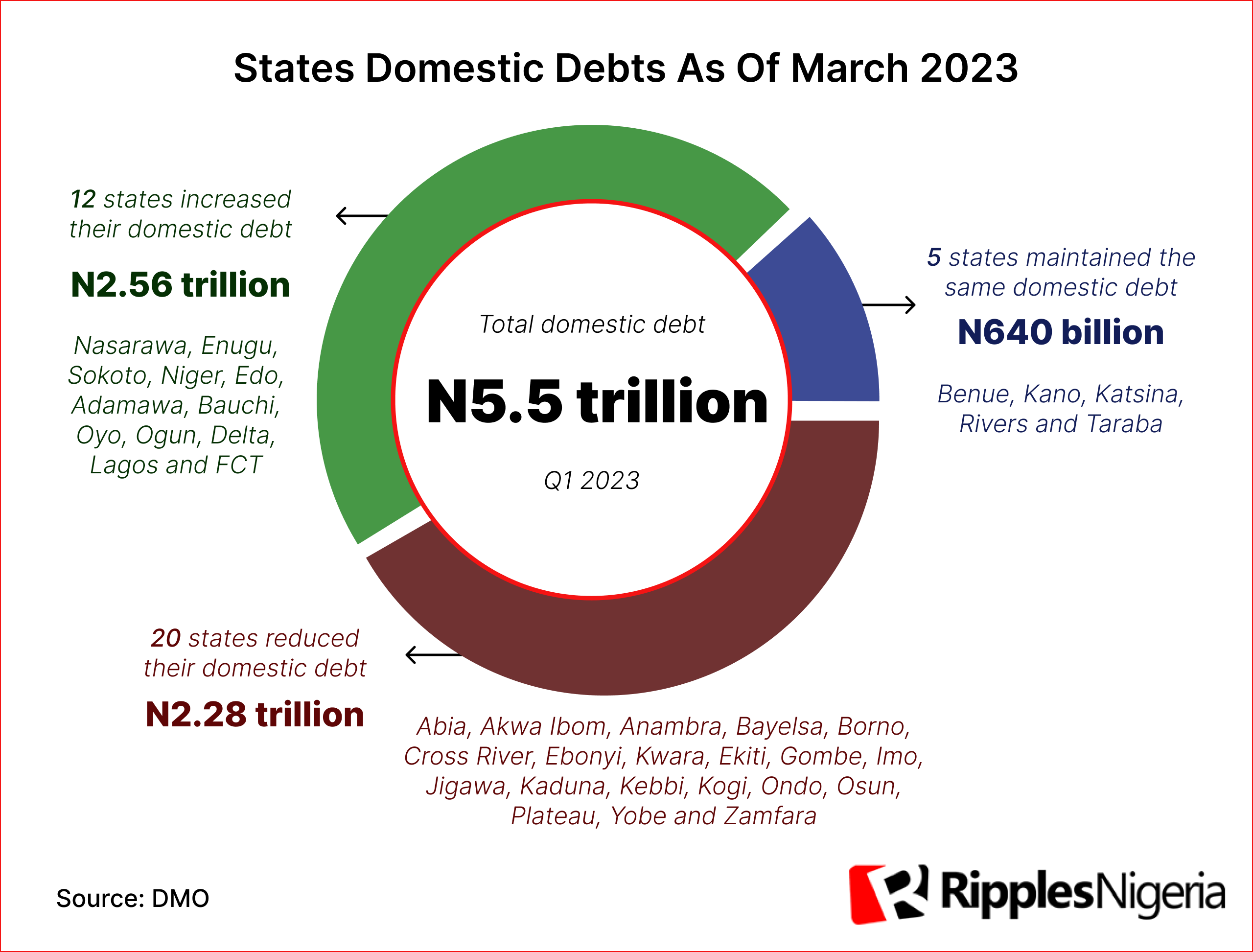Ripples Metrics
RipplesMetrics: How 12 Nigerian states increased their debts in three months

In the first quarter of the year between January and March 2023, 11 states in Nigeria, including the Federal Capital Territory, increased their domestic debts by a total of N2.56 trillion.
This is an increase of 8.64 per cent when compared to the total domestic debts (N2.35 trillion) the 12 states had as of December 2022. The states are Nasarawa, Enugu, Sokoto, Niger, Edo, Adamawa, Bauchi, Oyo, Ogun, Delta, Lagos and FCT.
According to the Debt Management Office report for the first quarter of 2023, the total domestic debt figure for the 36 states and FCT rose to N5.5 trillion as of March 2023 from N5.5 trillion recorded in December 2022. This is an increase of N141.2 billion within three months.
Within the three months, Delta State had the highest borrowings with a 38.63 per cent increase from a debt of N304.2 billion in December 2022 to N421.8 billion as of March 2023.
It was followed by Niger and Edo with 27.02 per cent and 14.33 per cent increases respectively. As of December, Niger and Edo had a domestic debt of N95.6 billion and N110.6 billion respectively but this increased to N121.4 billion and N126.4 billion as of the first quarter of 2023.
Ogun State increased its debt by 8.41 per cent to N293.2 billion, Adamawa increased its debt by 5.63 per cent to N131 billion, FCT by 4.63 per cent to N84.8 billion and Sokoto by 3.4 per cent to N93.7 billion as of March 2023.
Meanwhile, Enugu, Lagos, Bauchi, Oyo, and Nasarawa reported a domestic debt of N92.7 billion, N812.4 billion, N144.5 billion, N161.7 billion and N71.4 billion respectively in the first quarter of 2023.
Ripples Nigeria had earlier reported how Nigeria’s public debts stood at N68.9 trillion. The report revealed that Nigeria’s debt is unsustainable, as 73.5% of 2023 revenue would be used to service debts with a threatening capacity to repay its debt adequately.
READ ALSO:RipplesMetrics: Nigeria’s trade surpasses generated taxes in Q1, 2023
DMO said new borrowings will increase Nigeria’s total public debt-to-GDP ratio to 37.1% in 2023, according to projection, nearing the self-imposed debt limit of 40%.
Other Analysis
Aside from the 12 states which increased their debts, 20 states reduced their domestic debts while five states did not borrow any credit within the first three months of the year.
The 20 states had a combined domestic debt profile of N2.35 trillion in December 2022 but it dropped to N2.28 trillion in March 2023.
Zamfara, Akwa-Ibom, and Bayelsa had the highest decline recording 12.6 per cent, 5.8 per cent and 4.3 per cent reduction on their debt for Q1 2023.
Other states like Abia, Anambra, Kogi, Kwara, Ondo, Osun, Borno, Cross River, Ebonyi, Ekiti, Gombe, Imo, Jigawa, Kaduna, Kebbi, Plateau and Yobe had a percentage reduction between 4 per cent and 0.5 per cent.
Taraba, Katsina, Kano, Benue and Rivers are the five states with no borrowings.
The impact of the huge debts by the state governments means that most revenue generated might be targeted towards servicing debts, hence delaying infrastructural growth or delay in the allocation of allowances.
Although most borrowings are always geared toward building infrastructure, the delay in repayment leads to piled-up interest.
For instance, the Abia State governor, Dr Alex Otti recently said that the delay in the payment of salaries and arrears of pensions was due to the accumulated debt incurred by his predecessor.
Ripples Nigeria also captured how despite allocation by the federal government, poverty in some states is increasing due to the debt burden. These increasing debts point to how much states need to pursue revenue generation, diversification and reforms that can serve as pillars making the state self-sufficient rather than dependent.
By James Odunayo
Join the conversation
Opinions
Support Ripples Nigeria, hold up solutions journalism
Balanced, fearless journalism driven by data comes at huge financial costs.
As a media platform, we hold leadership accountable and will not trade the right to press freedom and free speech for a piece of cake.
If you like what we do, and are ready to uphold solutions journalism, kindly donate to the Ripples Nigeria cause.
Your support would help to ensure that citizens and institutions continue to have free access to credible and reliable information for societal development.